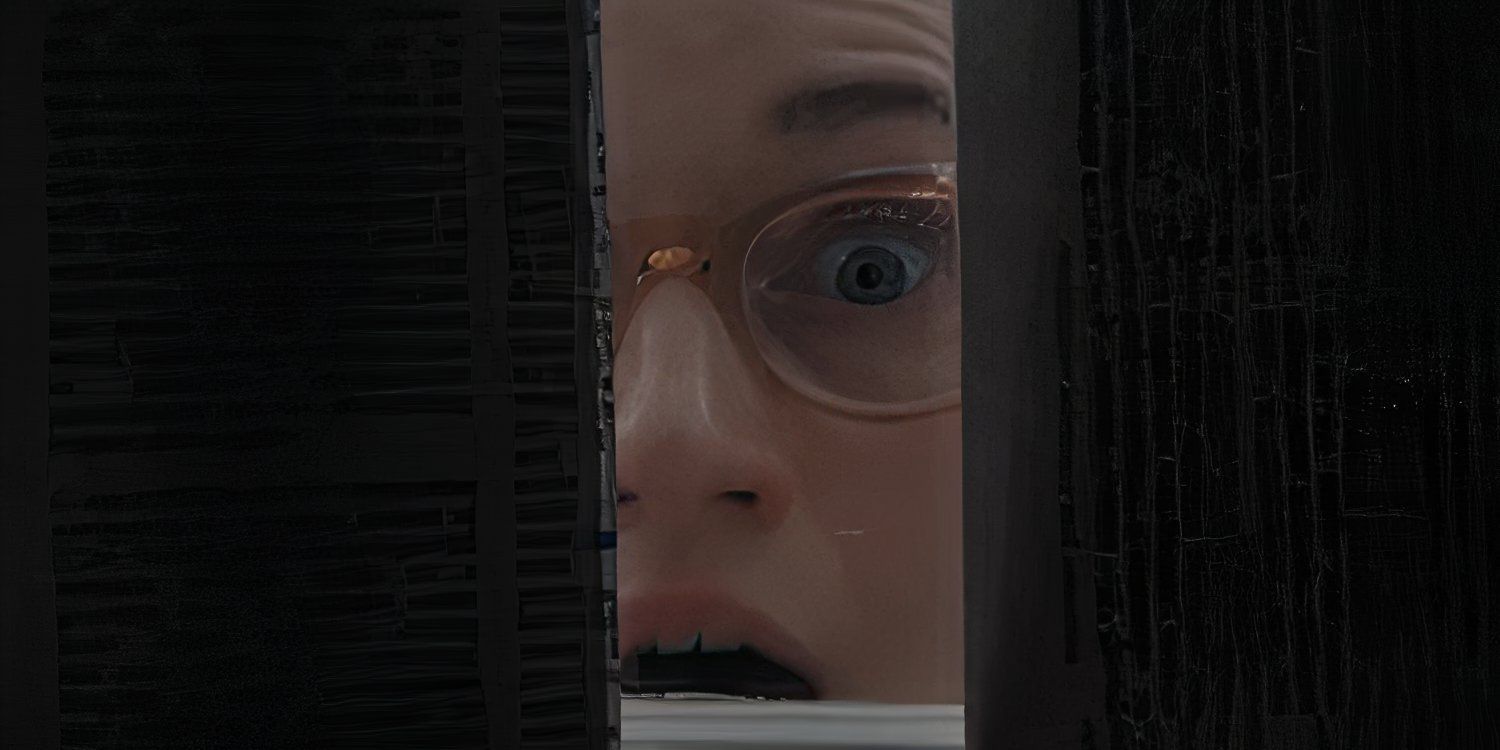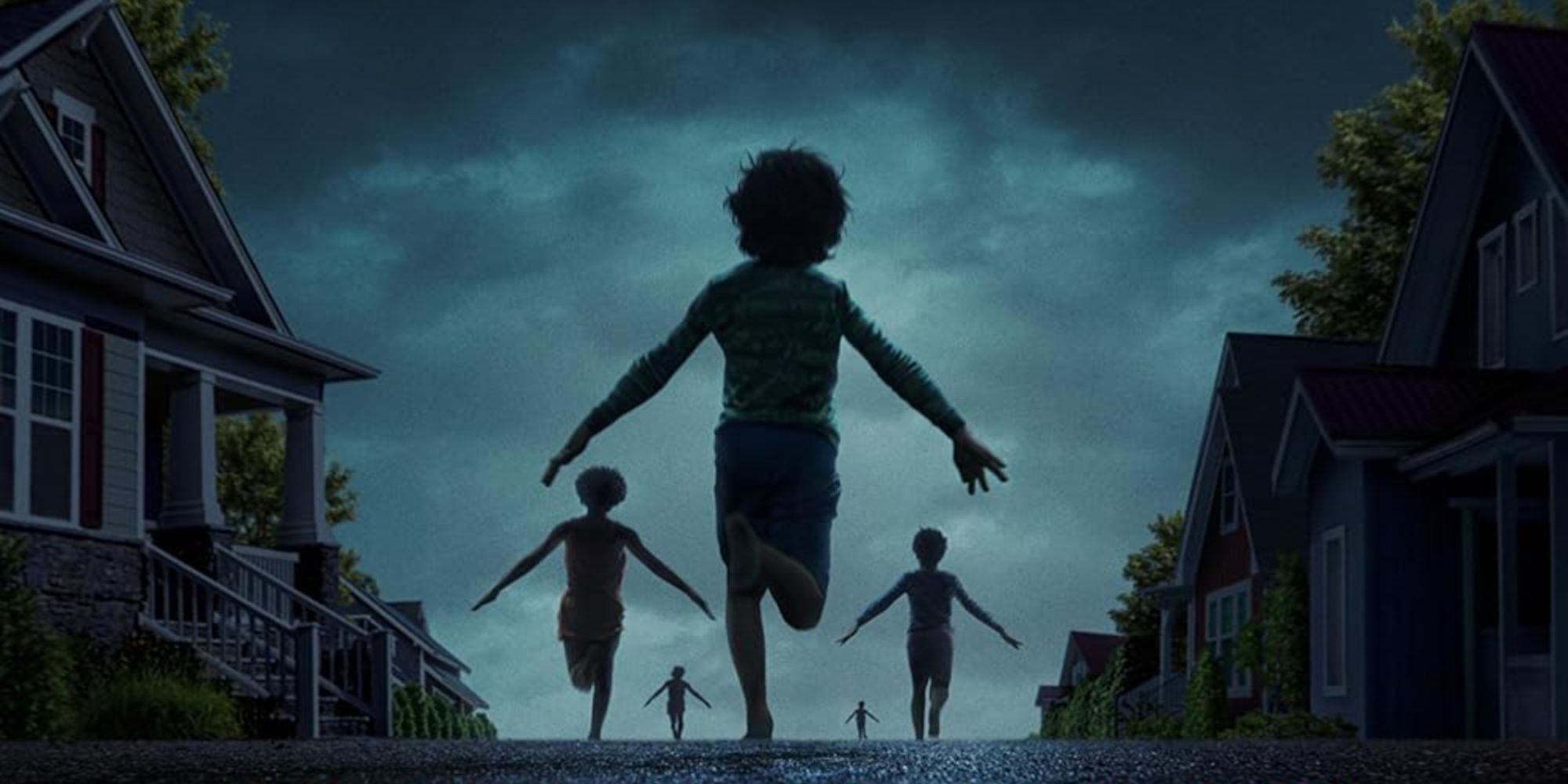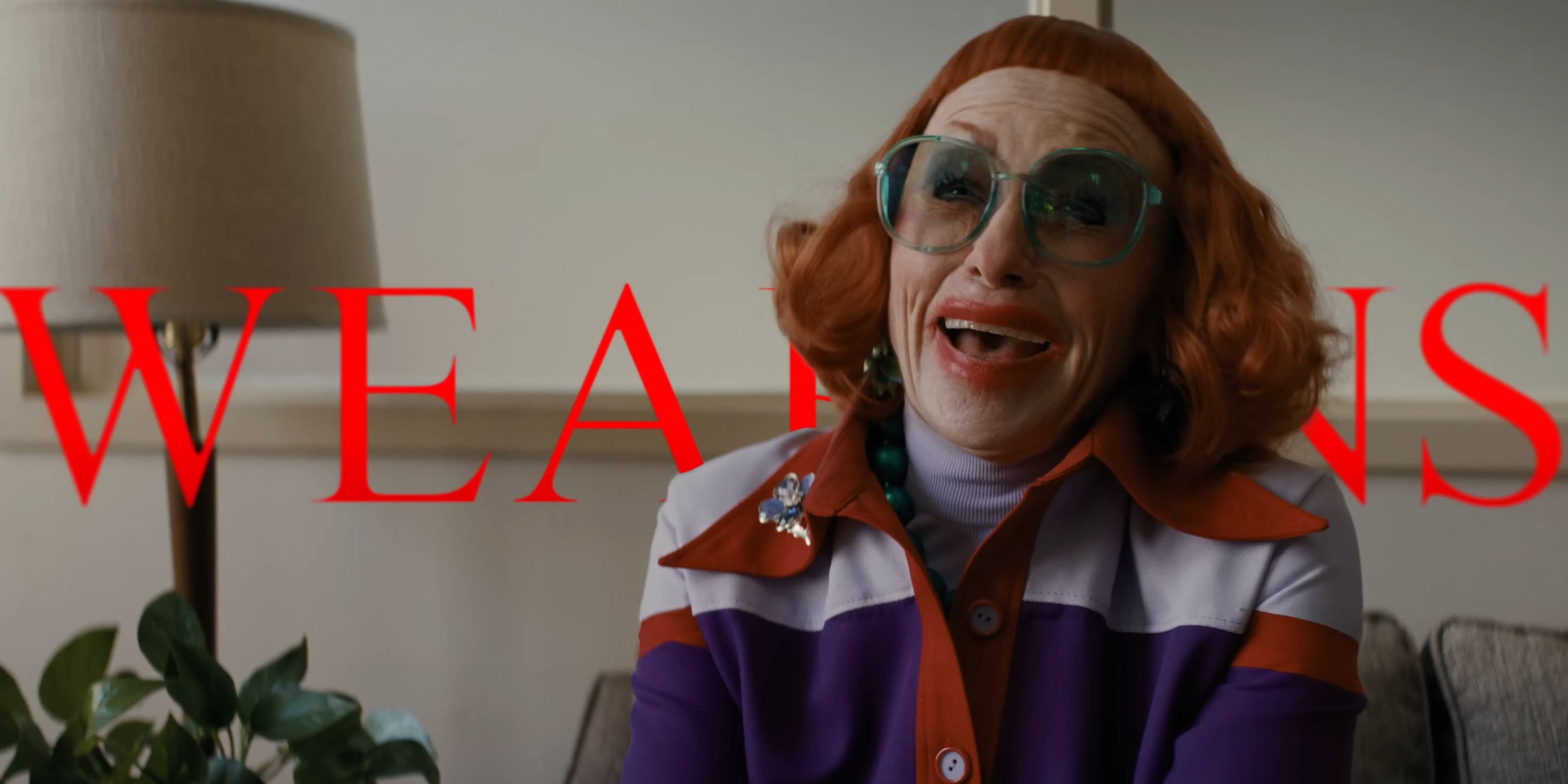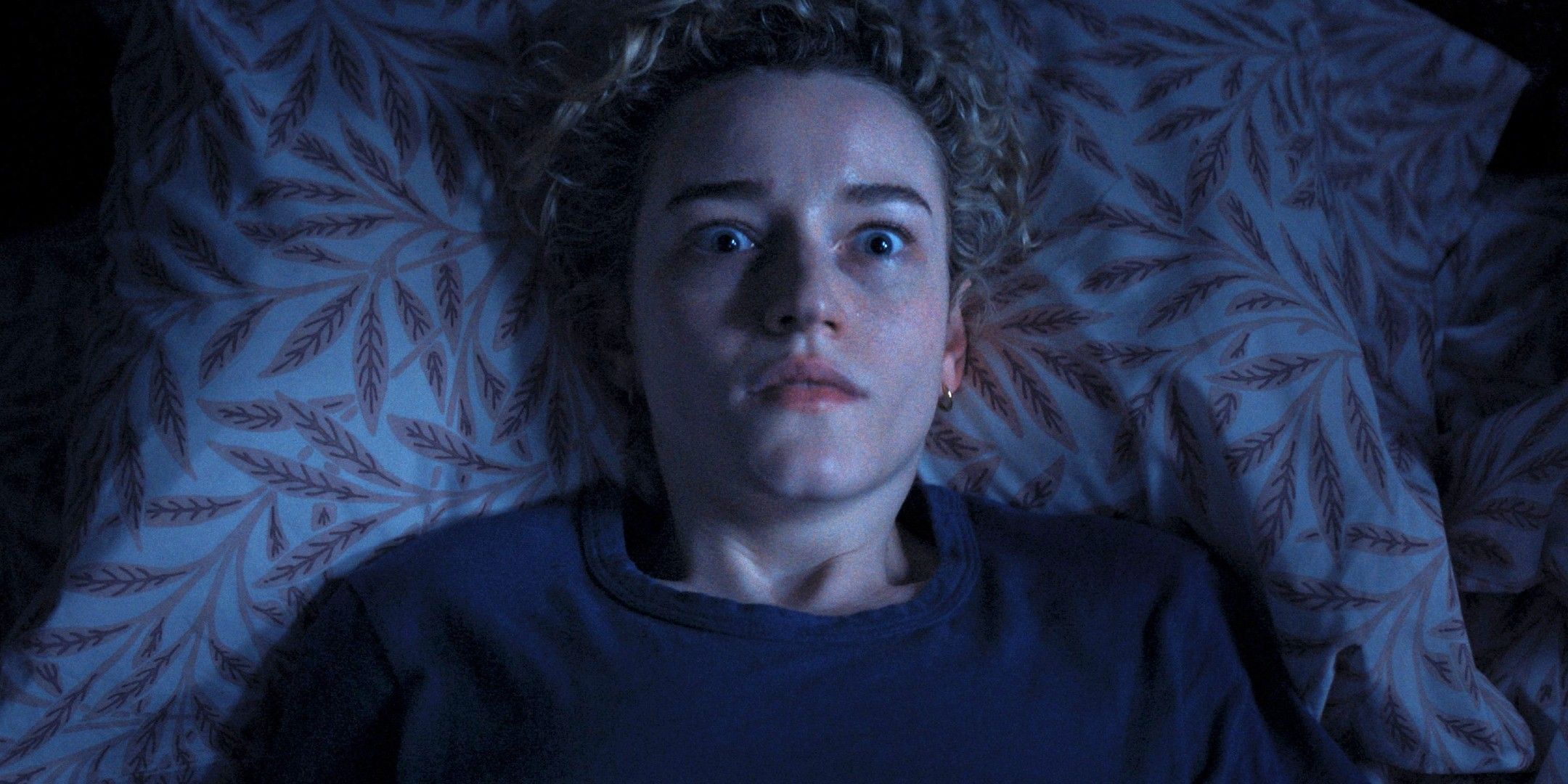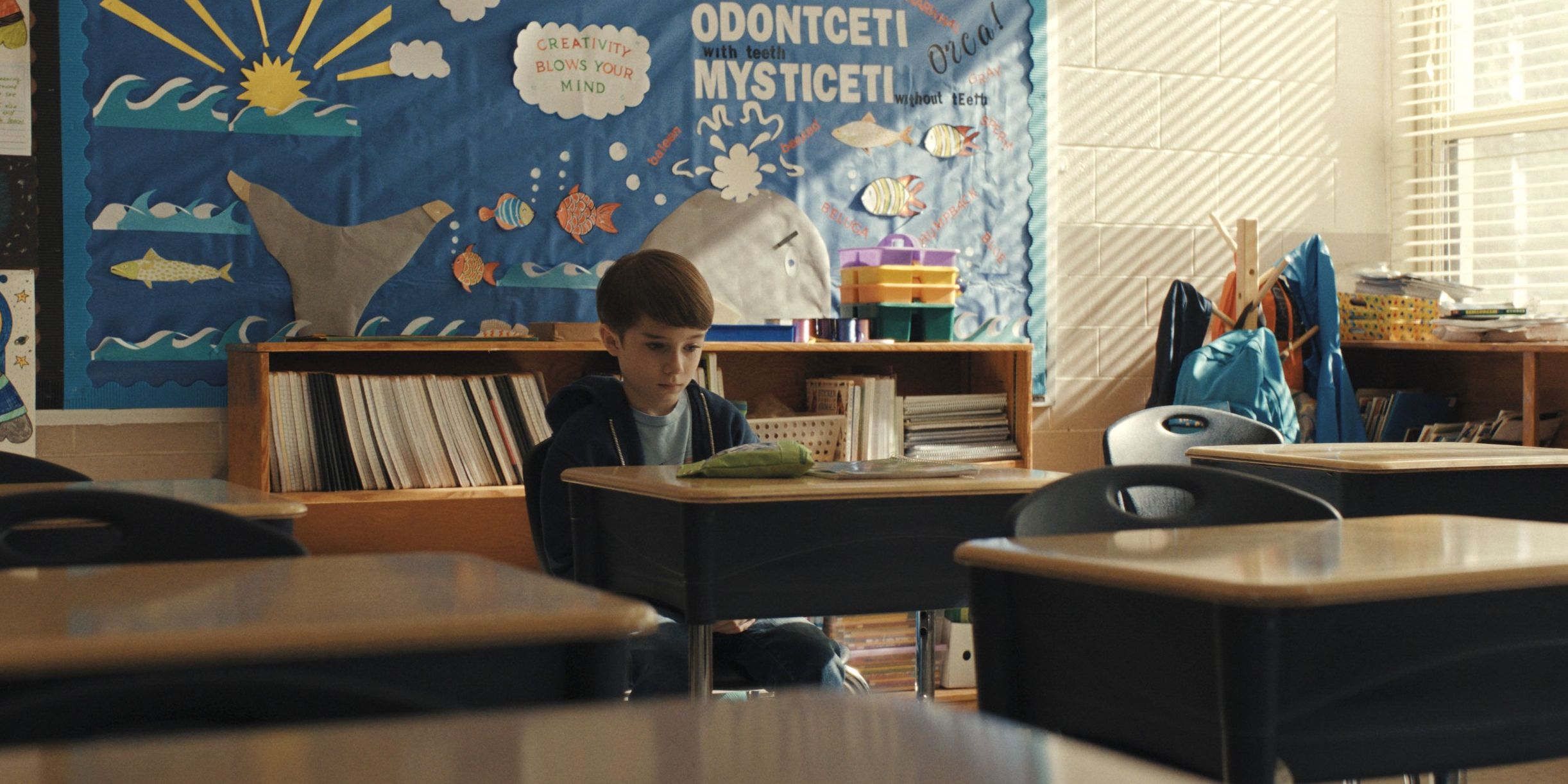Warning: Major spoilers for Weapons ahead!
After building a compelling horror mystery across most of its runtime, Weapons‘ ending brings things to an intense, disturbing, and darkly hilarious conclusion. The second solo-feature film from writer-director Zach Cregger revolves around the inexplicable disappearance of (almost) an entire third-grade class of kids, who all ran off from their small-town, suburban homes on the same night, at exactly 2:17 a.m.
The movie is divided into sections that follow specific characters, jumping around in time to catch them at key parts of their involvement in this case. Eventually, as more and more pieces slowly fall into place, it becomes clear that all the oddness in their town traces back to one woman: Gladys, a witch and the self-proclaimed aunt of Alex, who was the only child in Justine Grady’s class not to disappear.
At the movie’s climax, nearly all the main characters (save poor Andrew Marcus, the principal whose head was crushed earlier that day) find themselves in Alex’s house, where the missing children are being held. Justine and Archer, a parent of a missing child, walk right into Gladys’ trap; Paul, Justine’s cop ex-boyfriend, and James, the addict who incidentally discovered the missing kids, are the trap.
An almost cartoonish level of violence ensues.
What Happens In Weapons’ Ending
Gladys, recognizing the jig is up and telling Alex to prepare to leave town, rigged up Paul and James into an alternate version of the attack spell she’d used previously. Instead of unceasingly targeting a specific person, they’re set to activate if someone crosses the lines of salt left on the floor – which Justine unwittingly does. Paul rushes her, while James pounces on Archer.
Though he continuously lands knockout blows to James’ face, Archer is unable to keep him down for long. A traumatized Justine, after a potato peeler proves ineffective, manages to kill Paul with the policeman’s own gun. She then turns it on James and saves Archer, who makes his way to the basement and finds the missing children. In searching for his son Matthew, however, he finds Gladys instead.
Meanwhile, Alex, who has been watching Gladys work her horrors, steps across the salt that triggers his parents intentionally. He uses connecting rooms to outmaneuver them and makes his way into Gladys’ room, which they had been guarding. He snatches one of the thorny branches she uses for her spells, one already in use, and holes up in the bathroom to repeat the steps he’d seen her perform.
Gladys has set Archer on Justine and is watching him choke her out when Alex, having wrapped a strand of Gladys’ hair around the branch, snaps it. Sensing what has happened, she flees the house screaming, only to be pursued by the mob of children she’d magically kidnapped. When they catch her, they tear her limb from limb, breaking the spells.
Why Gladys Stole The Children (& Are They Okay?)
In Alex’s chapter of Weapons, we see Gladys welcomed into his family’s perfectly normal home, ostensibly because she’s sick and has nowhere else to go. From the conversations Alex overhears and the brief glimpse of her he catches, she looks to be at death’s door already. However, it isn’t long before the boy’s parents are practically catatonic, and a renewed Gladys is up on her feet.
After some time, she admits to Alex one night that her illness, whatever it might be, is real. Though she explains things the way one would to a child, it’s clear that Gladys has been somehow stealing the lifeforce of the boy’s parents, and that this accounts for her sudden physical change. She thought this would be enough, but she is starting to lose energy again.
It’s clear that whatever damage Gladys’ magic did is lasting.
So, she sets her sights on Alex’s classmates. Having secured an item belonging to each of them, she enacts the spell that summons them to her at 2:17 a.m., explaining why they all left their homes at exactly that time. She keeps them shut in the basement, where they stand unmoving, just like Alex’s parents; he has to feed them soup to keep them alive. In this way, she drains their lives away to sustain her own.
Following her death, we only learn snippets about her victims’ recoveries from Weapons‘ child narrator, who speaks to us from two years after the incident. The parents, it seems, remained relatively vegetative – they’re described as needing to be fed soup somewhere else, indicating they are still hospitalized all that time later. The children were well enough to return to their daily lives, though the narrator reports that only some of them just started talking again.
It’s clear that whatever damage Gladys’ magic did is lasting. In addition to being older, Alex’s parents were under the witch’s control for longer and were her sole energy source for a while, which would explain them being in worse shape. The kids have a better sH๏τ at a full recovery. But we’re meant to wonder, as we look in Matthew’s eyes during Weapons‘ final sH๏τ, whether Archer really got his son back at all.
Who Is Aunt Gladys, Really?
Weapons‘ villain is likely not who she’s originally set up to be. After appearing briefly in Justine, Archer, and James’ chapters, mostly to be a hair-rairing jumpscare, Gladys appears in earnest in Marcus’ office. She introduces herself as Alex’s aunt (more specifically, Alex’s mom’s sister), who was taking care of the boy while his parents were recovering from serious illnesses.
The latter part of that is quickly and brutally exposed as a lie, but the former claim is only complicated with time. In Alex’s chapter, before she arrives, Gladys is described as his mother‘s aunt; the sister of Alex’s grandmother. In an overheard fight of sorts, his parents remember having met her at least once, years ago, but are certain she didn’t attend their wedding. Alex’s mother, though, seems sure she’s family.
And she might be – but she’s likely even older than that. Gladys tells Marcus that Alex’s father has “a touch of consumption,” a term dating back to antiquity but which eventually became synonymous with, and then replaced by, tuberculosis. The bacterial illness was formally identified in 1882, and though the term consumption was still used in the early 20th century, it eventually became the stuff of classic literature and history books.
Marcus is struck by the anachronism. He can’t see (nor could a first-time viewer at this point in Weapons) how Gladys is making a dark joke about the man whose energy she has been consuming. But, when paired with her admission to Alex that she’s been sick for a very long time, this could indicate Gladys is at least a generation or two further back than her surviving family believes.
The Real Meaning Of Weapons’ Ending
Weapons is a complex film, and even though we get a definitive explanation of the violent strangeness that befell this town, it will likely prove fertile ground for many different thematic readings. But there are some key details that point toward certain interpretations.
First and foremost is the structure. Cregger’s fractured narrative makes for a thrilling tale, dripping information to us slowly, but it also encourages us to pay attention to how these individual characters’ lives collide with one another. Justine, Archer, Paul, and James all act on various selfish impulses, often destructive ones, without real concern for their impact.
The witch is a heightened version of this movie’s adults, a being of pure selfishness and indifference.
Weapons has multiple instances of people pressuring others to do something they expressly don’t want to (Justine and Paul’s drink; Archer watching the Baileys’ video) long before Gladys is introduced. There are also instances of almost comical indifference – for instance, a convenience store owner yelling at Justine to get out as a horrific-looking, homicidal Marcus chases her.
These touches draw an eerie parallel to Gladys and her magic. The witch is a heightened version of this movie’s adults, a being of pure selfishness and indifference. She is, as a motif repeatedly calls attention to, a parasite, robbing people of their autonomy for her own gain. But she just happens to be the horror-movie version of something we’re shown is fairly normal.
Of the adults, only Marcus seems motivated by concern for another’s welfare, and the universe punishes him for it most brutally. Alex is made vulnerable for the same reason. It’s notable that Gladys sought to control him not by threatening his own safety, but that of his parents.
This division between children and adults is also critical to Weapons, and similarly built into its structure. The film is narrated by a young girl, who tells this story to us as something true but suppressed, giving it the air of an urban legend. This world’s adults couldn’t handle the break with normality and have buried it; the children keep it alive in whispers.
In this light, the film’s narrative becomes a warning pᴀssed from kid to kid about the evils adults are capable of inflicting on them, as well as on each other. This question hangs over the last sH๏τ, alongside whether Matthew will ever recover – given what we’ve seen of Archer, is he really out of danger? Are any of them?
With its gory finale, Weapons is also a reminder of what kids are capable of doing in return. If the movie had to be distilled down to one idea, it would be that the traumas we try and push down have a way of hurting those around us, and the pain we put out into the world has a way of finding its way back to us. Anyone can become a weapon if they’re not careful.
